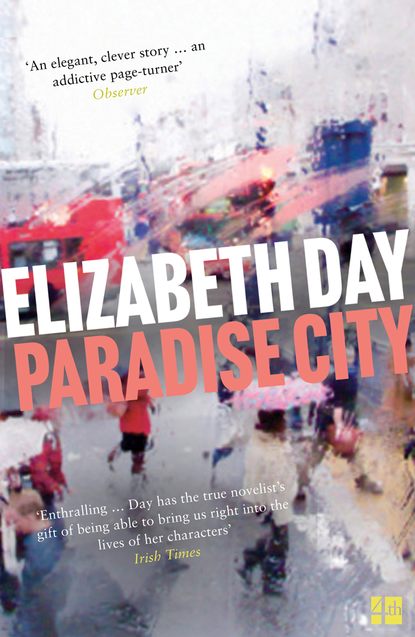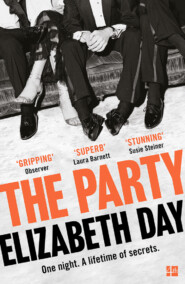По всем вопросам обращайтесь на: info@litportal.ru
(©) 2003-2024.
✖
Paradise City
Автор
Год написания книги
2018
Настройки чтения
Размер шрифта
Высота строк
Поля
The Sunday Tribune was one of the only nationals that still insisted its reporters must gather at 10.30 a.m. on a Tuesday morning in the offices of the overall editor and pitch two news stories for the weekend’s edition. When Esme first started there a little over eighteen months ago, fresh out of the Hunter Media trainee programme (flagship publication: Trucking Today), she had been desperate to impress. She’d brought in a bona fide scoop in her second week, involving the discovery of a protected bird species on land that had been earmarked for a controversial detention centre for asylum seekers. It ran on page five (right-hand pages were always the best) alongside a picture of an owl and some sad-looking Africans. The RSPB had called her story ‘game-changing’. The detention centre had to be shelved. A local MP had written to Esme to thank her in person. Dave hadn’t publicly acknowledged her success, but she had detected a slight thawing in his attitude towards her. She’d been thrilled.
But now, after a year and a half of Freedom of Information requests on how many chocolate HobNobs Cabinet ministers bought for hospitality purposes and Googling consumer-friendly research studies from American universities, Esme was starting to tire of it all. She had one half-baked notion for this morning’s conference about the rise in popularity of semi-naked charity calendars. They were everywhere, she’d noticed of late: middle-aged women with their baps out hiding their private parts behind a giant milk urn to raise money for some worthy cause. Esme had a hunch that the National Association of Nudists, a humourless organisation she’d dealt with in the past, would be unhappy about this. They’d probably think it wasn’t taking nudism seriously enough. She was sure she could whip them up into some kind of newsworthy frenzy.
Other than that, the story cupboard is bare and she’s almost at work. She alights onto High Street Kensington and looks up at the art deco Barker’s department store building, squinting as she always does to see if she can find her desk through the narrow, slatted windows. She waves at the security guard because she never remembers his name, then swipes her pass over the electronic entry gates and takes the escalator to the first floor.
Looking down, she realises she’s forgotten to take her trainers off.
‘Shit.’ Esme hates the thought of anyone seeing her like this: half-formed and unprofessional, like a mismatched extra out of Working Girl (perhaps her favourite 1980s film, in a closely fought contest with Ferris Bueller’s Day Off). She struggles to get her heels from her canvas bag before the final step of the escalator. At the top, she changes shoes quickly, slipping her stockinged feet into a pair of mildly uncomfortable patent-leather courts from Marks & Spencer and putting her dirty white trainers back into her bag. She hopes no one notices. But then, glancing up at the mezzanine balcony where everyone goes for their fag breaks, she sees someone staring at her. It’s Dave, shaking his head at her through a fug of cigarette smoke. The management had tried to move the smokers outside after the ban but no one had taken any notice and, in the end, they’d admitted defeat and built partitions on the balcony to pen everyone in. You could always tell what time of day it was according to how much smoke the enclosed balcony was holding. In the morning, it was a gentle mist of grey. By lunchtime, the smoke would have acquired its own twisting logic, pressing against the glass like freshly shorn strands of sheep’s wool. By evening, the balcony was a choking-hole filled with toxic dry ice.
Esme gets to her desk and logs on. Sanjay is already at his seat, directly opposite her, his face half obscured by the large Mac screen.
‘Morning, sunshine,’ he says, without taking his eyes from the computer. ‘Nice weekend?’
‘Yeah, thanks, um … what did I do?’ Esme puts her jacket on the back of her ergonomic chair, adjusted by Occupational Health to precisely the right height in order to avoid repetitive strain injury. ‘Can’t remember. But it was nice, whatever it was. You?’
Sanjay nodded.
‘The boyfriend was over from Rome,’ he said. ‘We stayed in and watched Breaking Bad because we’re exciting like that.’ He sipped from a giant Starbucks cup. Esme knew it would be a Green Tea. Sanjay had given up caffeine for a new year’s resolution and was still sticking to it with all the puritanical zeal of a Mayflower pilgrim.
‘Have you got stories?’ he asked.
She shook her head.
‘Me neither.’
There was a special rhythm to Sunday newspapers. Tuesday mornings were tense and mildly fractious as everyone tried to cobble together something for conference. By lunchtime, a relaxed bonhomie had set in. When Esme had first started at the Tribune, most of the newsroom then disappeared to lunch ‘contacts’ while secretly lunching each other and racking up considerable wine bills that they then claimed on expenses. Those days had long passed and she wasn’t entirely sad to see them go. There was a limit to how effective she could be after several large glasses of Sauvignon blanc in the middle of the day.
Wednesdays were for faffing around – doing the odd telephone interview to stand up a story and surreptitiously booking holidays online when Dave wasn’t looking.
By Thursday, you needed to have at least one concrete story for that weekend’s paper so that Dave could add it to the news list and present it to the editor. If you didn’t, then you were in the perilous position of being sent out to cover running stories like murder cases or political scandals and that involved a lot of standing around with other journalists in the rain, waiting for an important person to comment, then elbowing your way to the front when they did so.
Friday consisted of long hours, frantic typing and last-minute changes of mind from the desk. You were lucky to get out by midnight. Then on Saturday, the misery of working on a weekend gave rise to a shared solidarity of spirit that left you feeling strangely cheerful. When the paper went off stone at 7.30 p.m., almost everyone decamped to the pub (apart from Rita, the part-time sub, who was older and wore the perpetually harassed expression of a working mother whose needs were conspicuously not being met).
Sunday started with a hangover and a nervous feeling in the pit of Esme’s stomach about where her article would appear and whether she’d got any fact or quote horribly wrong. The first thing she did was to walk round the corner from her flat to buy the papers from a shop on the Uxbridge Road. Every week, without fail, the newsagent would make the same joke as he totted up the total on the cash register.
‘Light reading?’
Every week, Esme gritted her teeth and smiled politely at this charmless imbecile then went home and flicked straight to her pieces. Some weekends, the article she’d expected to see wasn’t there and she realised it had been spiked and no one had bothered to tell her. Those were the worst days. She found it hard to pull herself out of a bad mood when she had no byline in the paper. It felt as though she didn’t exist.
It is just as she is typing ‘academic study’ into Google News that Esme feels a looming presence behind her chair.
‘Try “Watergate”,’ Dave says, smirking. ‘See if anything comes up. I’ve heard, on the down low, that geezer Nixon might be up to something.’
Esme flushes. Across from her, Sanjay is busy looking busy.
‘Can I have a word?’ Dave asks ominously. ‘In my office.’
She follows him into a glass-partitioned box that Dave has clung on to, in spite of the owners’ constant attempts to make everything into an open-plan, twenty-four-hour, internet-focused news hub. It is an airless room: the windows overlook the building’s interior atrium and the walls are lined with bookcases stuffed with out-of-date editions of Who’s Who, lever-arch files and long-ago awards certificates encased in dusty Perspex. On one wall, there is a framed picture of the Sunday Tribune wall clock from the glory days of Fleet Street, set perpetually to ten past two: a civilised time, Esme always thinks, for a more civilised era.
‘Take a seat,’ he says, gesturing to a chair covered in back copies of the New Statesman and old Snickers wrappers. Esme removes the detritus and sits, opening her notepad to a fresh page and readying her pen in an effort to look on top of things.
‘Nice piece on Sunday,’ Dave says, chewing his thumbnail.
Esme is surprised. The optimism study was precisely the kind of thing Dave usually hated: no investigation, no titillation, just a space-filler to keep the readers happy while they ate their Sunday morning croissants and muesli.
‘Sir Howard complained,’ he says.
‘Howard Pink?’ Esme jots down his name for no reason.
‘Yeah. We used a picture he wasn’t happy with.’
‘Well that was the picture desk, not me …’
Dave waves her objections aside. ‘Yeah, I know that, obviously,’ he says, over-enunciating each word to underline her frustrating slowness. He looks at her levelly across his desk. His skin is weathered and pouchy and he has a patch of eczema on one corner of his mouth. The backs of his hands are smattered with faint brown hairs. He’s only forty-seven but seems older, more weary. Esme realises she is staring and drops her gaze. Her mouth is dry.
‘I wondered why Mike used it actually,’ she says. ‘Given all the stuff that happened to Sir Howard. It didn’t seem exactly right for a light-hearted …’
Dave cuts across her. ‘I told Mike to use it.’
‘Oh. Right. I just thought, what with Sir Howard’s daughter going missing all those years ago …’
‘Yeah, I know, all very sad,’ Dave says, not seeming remotely perturbed. ‘But life goes on, doesn’t it, and Sir Howard hasn’t exactly been the shy and retiring type since then, so we were perfectly within our rights to use the picture, but …’
She waits. Dave stands up, flexes his arms and takes up the imaginary 4-iron, swinging it back and forward, warming up to hit some non-existent ball. ‘Well, his PR guy had asked newspapers not to use that particular photo. Pink doesn’t like it, apparently. Thinks it makes him look like a buffoon which is, of course,’ Dave takes aim somewhere near the under-watered rubber plant on his bookshelf and swings, ‘true.’
Esme suppresses a groan. She finds this display extremely tiresome. It is what Dave believes to be a show of masculinity, the news editor’s equivalent of a peacock displaying its plumage. Every time she thinks she might properly fancy Dave, that it might be more than a workplace crush, he goes and does something that shatters the idea completely.
‘Right, so why did you use it then?’
Dave grins. ‘Because he told me not to.’
Esme smiles in spite of herself. ‘And what I’d like you to do, young lady, is to call Pink up, apologise, say it’s not your fault, beyond your control blah, blah, blah but that the least you could do is take him out for lunch to say sorry.’ Dave flicks through a Rolodex on the desk in front of him. He is the only person she knows who refuses to get an iPhone or a BlackBerry and keeps all his contacts on a series of battered index cards. ‘Take him to Alain Ducasse at the Dorchester, he’ll love that,’ he says, handing over a card which has several numbers on it, all but one of them scribbled out in red ballpoint pen.
‘Thanks, I can look the number up …’
‘Take it.’
She reaches across, accidentally touching his fingers as she takes the card. She feels a small internal spasm as she does so.
‘You’ll need to speak to his PR man first. Rupert Leitch. He’s a mate of mine from university days. I’ll let him know you’re calling—’ Dave hands her another dog-eared card. ‘Well sod off then,’ he says, clicking on his computer mouse. ‘Look lively.’
Esme returns to her desk, closing the door to Dave’s office as she leaves.
‘What was that about?’ Sanjay asks.
‘Howard Pink,’ she says.
‘The guy whose daughter went missing?’









